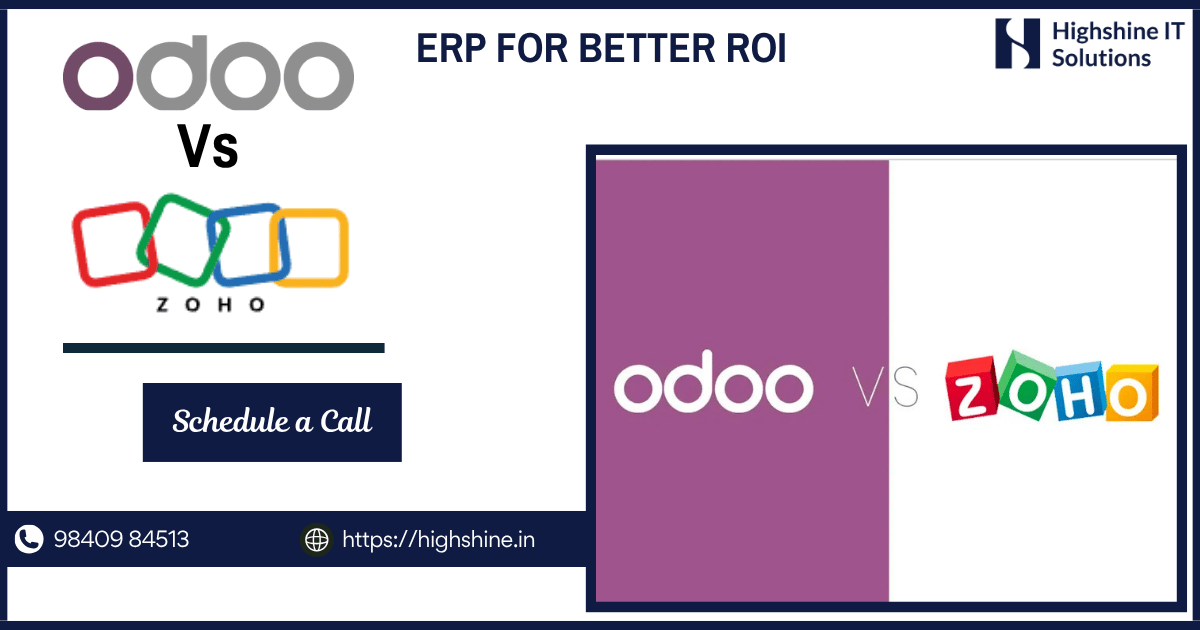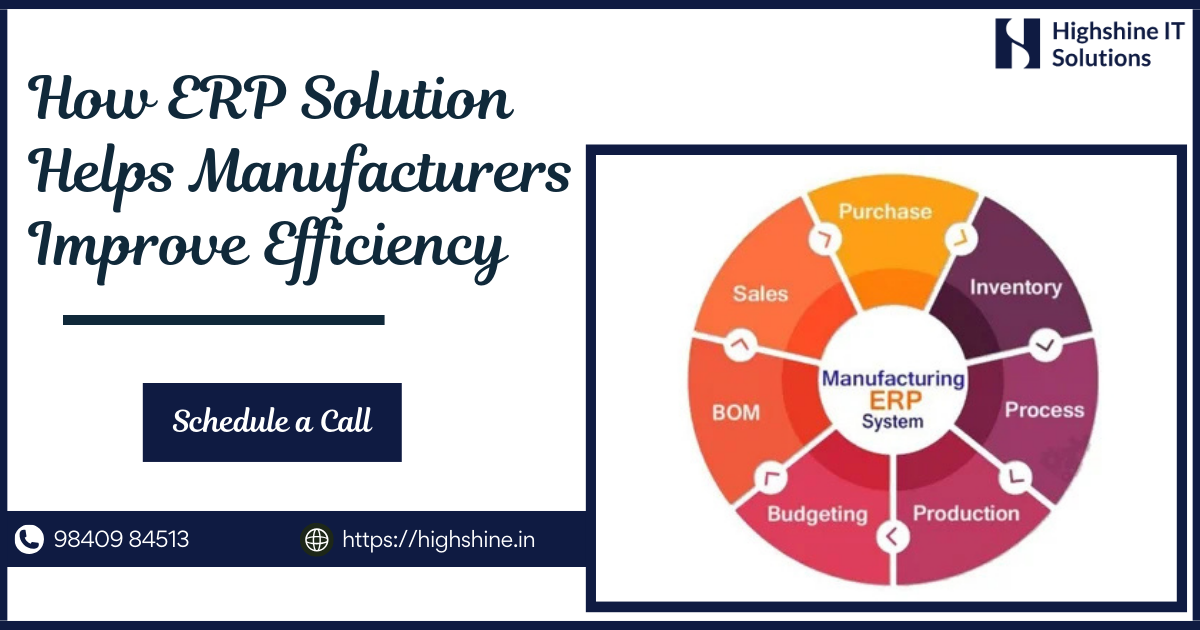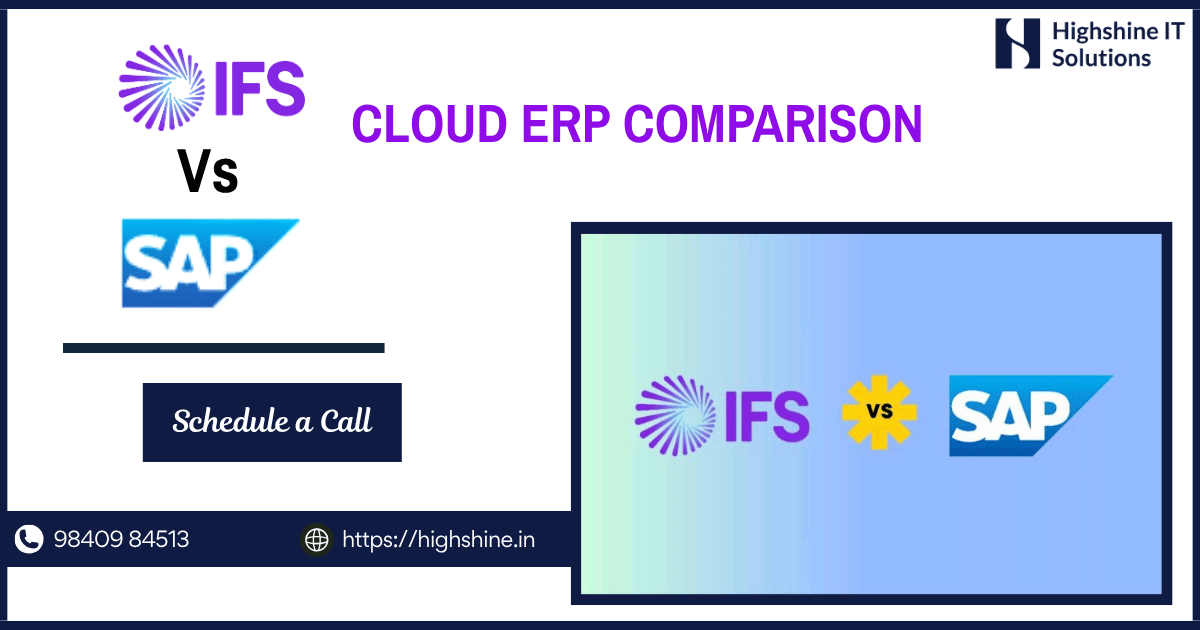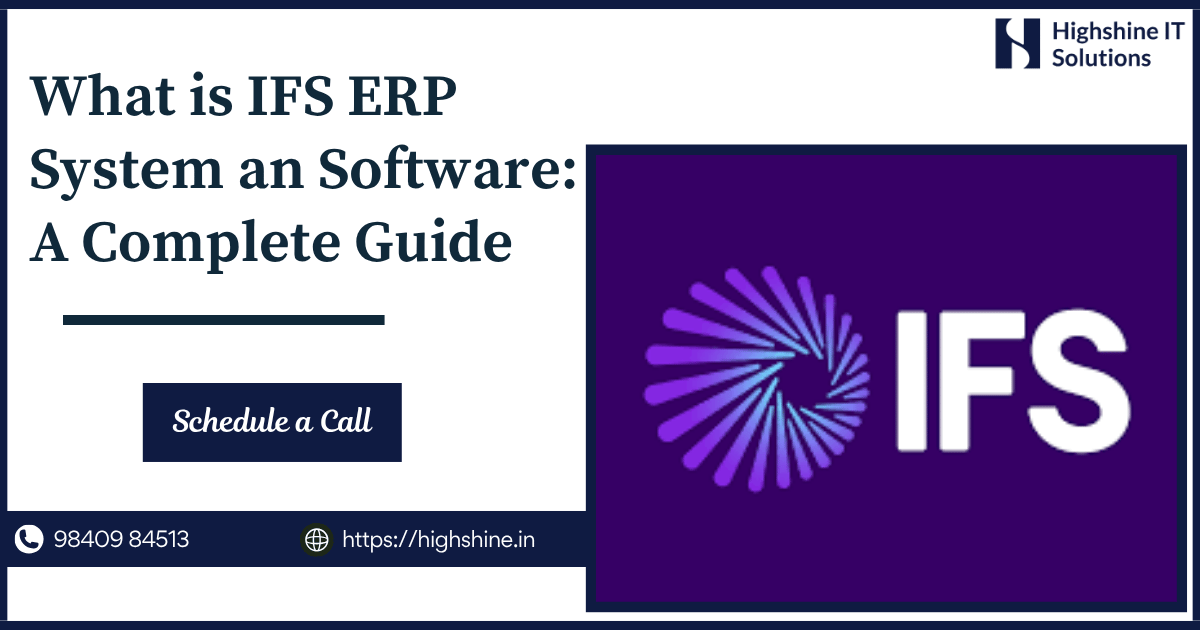
Odoo ERP vs Zoho ERP: Which Platform Offers Better ROI?
All businesses face a growing number of complex requirements across departments. That is why Enterprise Resource Planning (ERP) systems are important for modern businesses. These systems are important tools for businesses that aim to streamline operations, increase productivity, and gain real-time insights into their processes.
These software platforms incorporate various functions across an organization, such as finance, human resources, supply chain management, and customer relationship management, into the unified system. Even though there are many ERP platforms available in the market, Odoo ERP and Zoho ERP stand out as popular choices.
Both have their own set of features, advantages, and limitations. Companies should analyze all the factors to choose the one that aligns with their specific business needs.
In this blog, we will compare Odoo vs Zoho and evaluate which platform provides a better Return on Investment (ROI) for businesses. We will also discuss Odoo's advantages and limitations, as well as Zoho's advantages and limitations, before concluding which ERP system is the best for your business.
ODOO Vs ZOHO ERP Comparison
What is Odoo?
Odoo is an open-source software that provides a comprehensive suite of business applications, including sales, inventory, accounting, human resources, manufacturing, and project management. Odoo is highly customizable, allowing businesses to tailor the system to their specific needs.
What is Zoho?
Zoho, on the other hand, is a cloud-based software designed to help businesses manage their operations efficiently. Zoho offers a range of applications that cover functions such as sales, finance, marketing, human resources, and customer support.
Odoo vs Zoho: Cost Effectiveness
When comparing Odoo vs Zoho, cost is one of the main factors that businesses need to consider. Both of the platforms offer different pricing models, making it important to analyze their cost-effectiveness.
Odoo ERP Pricing: Odoo provides both a free version and a paid version. Odoo Community is a free version, and Odoo Enterprise is a paid version. The Enterprise version offers advanced features and dedicated support. The cost for Odoo Enterprise can vary depending on the number of users and modules.
The standard price is INR 580 per user per month for one user. This includes all apps in a single subscription. On the other hand, a custom plan costs INR 890 per user per month for one user. It includes all apps and the possibility of managing multiple companies and connecting with API.
Zoho ERP Pricing: Zoho ERP follows a subscription-based pricing model, offering four tiers. This includes standard, professional, enterprise, and ultimate. Here is the pricing for each plan.
- Standard: INR 800 per user for one month
- Professional: INR 1400 per user for one month
- Enterprise: INR 2400 per user for one month
- Ultimate: INR 2600 per user for one month
When it comes to cost, Zoho ERP offers a more budget-friendly option, especially for small to mid-sized businesses. However, Odoo ERP is more scalable and can help businesses with complex needs.
Odoo vs Zoho: User-Friendliness
Another important aspect to consider when evaluating Odoo vs Zoho is their user-friendliness. Both of the platforms are easy to use, but they offer different user experiences.
Odoo ERP: The interface in Odoo is highly customizable, which means it can be customized to suit the specific requirements of each business. However, this level of customization can sometimes make it more challenging for beginners. Learning Odoo may be difficult in the beginning, especially for users without technical knowledge.
Zoho ERP: Zoho is known for its intuitive and user-friendly interface. It provides businesses with a smooth user experience, making it easier for teams to adopt and use the platform without extensive training.
Overall, Zoho might be the better choice for businesses that prioritize ease of use and minimal setup time.
Odoo vs Zoho: Customization and Flexibility
Odoo ERP and Zoho ERP also differ when it comes to customization options.
Odoo ERP: One of the standout features of Odoo ERP is its high degree of customization. Odoo is open-source, and businesses can modify the platform's code to meet their specific needs. It offers an extensive list of modules, and businesses can develop additional features to create a tailored solution. However, this requires skilled developers, which could lead to higher costs.
Zoho ERP: Zoho ERP also offers a good degree of customization, but it is more limited compared to Odoo. It allows for basic customizations through workflows, reports, and fields, but for advanced modifications, businesses might need to rely on third-party developers or apps from the Zoho marketplace.
When we compare Odoo vs Zoho for its customization, Odoo ERP might be the better choice.
Odoo vs Zoho: Features and Functionality
When comparing Odoo ERP vs Zoho ERP, the features of these platforms are essential to consider.
Odoo ERP: Odoo has a variety of built-in modules that help to cover almost every aspect of business operations, from sales, CRM, and HR management to manufacturing, supply chain, and accounting. It is a one-stop shop for businesses that require a comprehensive ERP solution.
Zoho ERP: Zoho offers a variety of features but is generally seen as more focused on specific areas, such as customer relationship management (CRM) and sales automation. While Zoho has many integrated apps, it may not offer the same level of functionality as Odoo.
If you require a more versatile version, Odoo ERP is the best choice for you.
Odoo vs Zoho: Scalability
Odoo ERP vs Zoho ERP also differs in terms of scalability.
Odoo ERP: Odoo is highly scalable, making it suitable for businesses of all sizes, ranging from startups to large enterprises. The platform's wide range of modules allows it to grow with your business. As your business operations expand or change, you can seamlessly add new modules or upgrade existing features to improve functionality and efficiency and drive growth. This flexibility ensures that Odoo remains a valuable asset throughout your business journey.
Zoho ERP: Zoho ERP is also scalable but may not be as flexible as Odoo for very large enterprises with complex needs. Zoho works well for small to medium-sized businesses but may require third-party integrations for large-scale operations.
For example, Zoho CRM is a product that offers only customer relationship management services. If you need other features, you have to buy different products, or you should hire someone for technical customization. At the same time, Odoo's paid plans provide you with all the apps for the price of one license.
For businesses expecting rapid growth or dealing with complex operations, Odoo ERP is likely the better choice.
Odoo vs Zoho: Integration Capabilities
Integration is important for businesses that rely on third-party software to manage different aspects of their operations.
Odoo ERP: Odoo ERP offers excellent integration capabilities. It integrates seamlessly with other Odoo applications and third-party software. You can include your data from different apps and systems with API integration to deliver advanced workflow automation.
Zoho ERP: Zoho ERP also integrates with other Zoho applications and popular third-party tools. However, it may not have the same extensive integration options as Odoo.
When considering integration, Odoo ERP might be a more flexible choice for businesses with a variety of system requirements.
Odoo vs Zoho: Customer Support
The level of customer support provided by each platform is crucial, especially for businesses that require assistance during implementation and usage.
Odoo ERP: Odoo offers various support options, including community support, forums, and paid enterprise support. The open-source nature of Odoo means that support can sometimes be more community-driven, but businesses can opt for professional help if needed.
Zoho ERP: Zoho offers 24/7 customer support through phone, email, and live chat. Zoho is known for providing responsive customer service, making it a great choice for businesses that require consistent support.
Odoo ERP vs Zoho ERP: Advantages
Odoo Advantages:
Odoo offers high levels of customization.
It has a wide range of modules covering nearly every aspect of business management.
It is scalable and flexible, making it suitable for businesses of all sizes.
It provides strong community support.
Zoho Advantages:
It has a user-friendly and intuitive interface.
The cost is affordable, especially for small businesses.
It offers excellent customer support.
It provides good integration with other Zoho applications.
Odoo ERP vs Zoho ERP: Limitations
Odoo Limitations
Learning Odoo is difficult for beginners.
It requires a lot of technical knowledge for advanced customization.
It can be more expensive, especially for the Enterprise version.
Zoho Limitations
Only limited customization is available in Zoho when compared to Odoo.
It may not offer the same level of depth in features as Odoo.
Conclusion
When analyzing various factors of Odoo vs Zoho, it is clear that both platforms offer some unique features. While Zoho is more user-friendly and cost-effective for small to medium-sized businesses, Odoo provides more flexibility and functionality, especially for larger enterprises.
Odoo ERP offers better long-term Return on Investment (ROI) for businesses that require a highly customizable, scalable, and feature-rich ERP solution. Zoho users who need change might consider Odoo ERP. HighShine offers the Odoo ERP that simplifies store sales, inventory, and finances. It is utilized in many business strategies and works for multiple industries.
Thus, if a business needs a comprehensive ERP solution that can grow and evolve with their needs and changes, Odoo ERP stands out as the superior choice for achieving a better Return on Investment (ROI).






